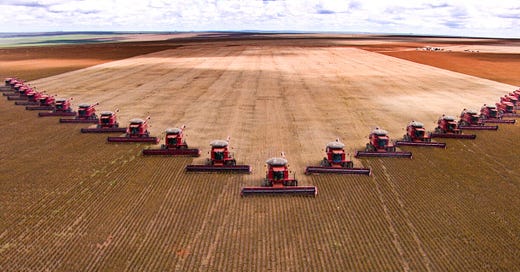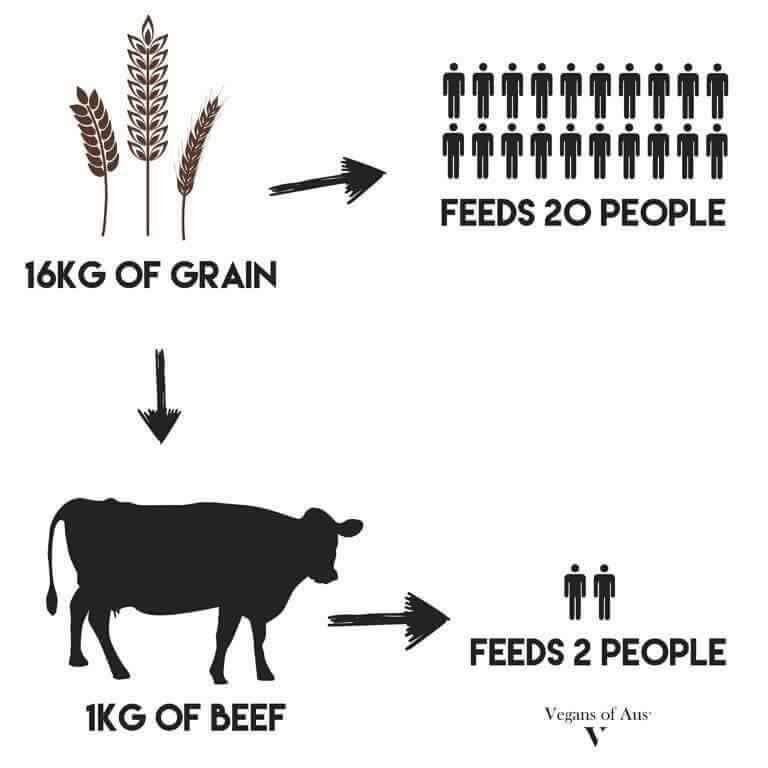One of the most common false narratives from the Land-Sparing crowd is the idea that if we were more efficient with our food production it would free up millions of acres of land to be re-wilded. I come across this so often, that I decided to procrastinate my taxes and finally put some thoughts to paper.
For the vegan crowd, this gets expressed most often as, “If everybody just ate plants, we’d use a lot less land.” Efficiency is also the underlying ethos of the lab-meat companies, the plant-based food companies, and a whole lot of sparing-oriented NGOs and think-tanks.
This is a good example of what i've been writing about in the sharing vs sparing series; the idea that efficiency is a solution, without taking into account Jevons’ Paradox, externalities, or long-term effects of how different land-use systems affect ecological function. As I wrote in my last post, greater efficiency in food systems means lower per-unit impact but higher aggregate impact over time due to Jevons’ aradox, and thus a greater manifestation of externalities, whether they be positive or negative.
BUT ISN’T DEMAND FOR MEAT DRIVING DEFORESTATION OF THE AMAZON?
The assumption that demand for land goes away if we stop eating meat is a fantasy, and fails to account for second order effects.
Imagine you are a Brazilian soybean farmer in Campo Verde, Matto Grosso. Your grandpa bulldozed savannah ecosystems to convert them to monocrop soybeans, and you sell to a distributor connected to Cargill or JBS. You work hard, you make a decent living, and you consider yourself a steward of the land, and hope your kids will take over the farm one day just as you did from your parents. Suddenly the market for soybeans takes a serious hit, because a vegan hegemon has declared eating chicken illegal (by the way, the only way the world will ever go vegan is if a vegan hegemon enforces it by law. People love meat too much, and if your solution starts with “if everybody would just” then it isn’t a real solution, but I’m getting sidetracked so just go with me).
If that happens are you going to just stop farming and abandon the land your grandparents settled? You’ll stop farming soybeans, sure, but abandon your land? You’ve got water, you’ve got soil (at least for now), you’ve got a household, and you’ve got a legacy to uphold. More likely you’ll convert the farm to timber, or palm oil, or rubber, or hemp, or cotton, or coffee. Bottom line is, if you’re a farmer the last thing you will do is abandon your land just because one crop fell out the bottom. Don’t be absurd.
Does this illustrate well enough why blaming one commodity (beef, in general, for the sparing crowd) for deforestation and desertification fails to see the underlying cause? I hope so. So what is the underlying cause?
The underlying cause of human-driven degradation of ecosystems is that we exchange natural capital for financial capital wherever, however, and whenever we can, unless there are policies, incentives, or cultural practices in place that prevent us from doing so. The long term effects of this pattern are too long-term for most land-managers to worry about or even notice, hence the 6000-8000 year human history of shifting-baseline syndrome and long-term suicidal food systems.
This point is so important because it gets to the root of the sharing vs sparing argument. We don’t just use land for food — we use it for fuel, fiber, construction, medicine, drugs, ships, and the idea that if we could stop using land for one purpose that we won’t just use it for another fails to account for people who are land managers and make their living from doing so. It also fails to account for the insatiable appetite of humanity to consume. Vegans may not eat meat, but they still want nice houses, and more clothes and shoes, and vacations to London, and to attend yoga retreats wearing the latest petro-derived fabrics. We all consume, and we find joy and pleasure in doing so, and today nearly everything we consume comes from the exploitation of ecosystems. Remember, getting more efficient at the exploitation of ecosystems leads to greater exploitation of ecosystems in the long run, which is why efficiency is not a solution, at least not on its own. If you’re paying attention, you’ll find that in discussions on climate, food, nature, ag-tech, and investing, the assumption that efficiency is the answer is everywhere. And it’s wrong. Indeed, all these folks love efficiency because higher efficiency means higher profitability, but it doesn’t solve the fundamental problem of how do we feed ourselves without destroying the planet.
PS: Before i get all kinds of hate mail, let me clarify a few things here. I am not writing this to excuse ag-driven deforestation, or CAFO meat production. I hate CAFOs, and consider them one of the greatest evils of our age, and think they should be illegal everywhere. If I could wave a magic wand to end global deforestation i would do so in a heartbeat. Don’t come at me with the false dichotomy that disagreeing with a deeply flawed narrative means I’m a friend of ecological destruction. Rather, I want us to build solutions that are actually going to work, and don’t rely on “If everybody could just.”






Interesting argument, but it makes a big assumption: that vegans want bigger houses and more brand new stuff, such as clothes. While we all need food and shelter and basic necessities, some of us, vegan or not, actually prefer small houses and second-hand stuff, including clothes. Perhaps the bigger problem is overconsumption.
We have been convinced that our lumber is grown in natural forests, the reality is our lumber is grown in mono crop plantations with no biodiversity with more ecological downsides (water pollution, flooding, depleting soil) that needs to be included in the total ecological picture. The amount of land used for growing wood products in California is 16.1 million acres - the next largest category of ag production is "all grains" at only 6.2 million acres. We are told by the lumber industry that lumber is renewable, this only true within a very narrow definition of “renewable”